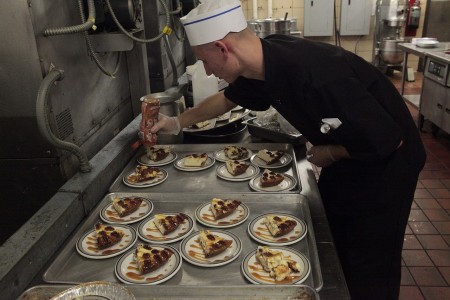Tipping in restaurants is a widespread practice in need of reform, according to a new study conducted by University of Guelph professors.
They found tipping poses significant challenges for restaurants, with managers seeing difficulties in hiring chefs and maintaining a cordial workplace environment. Surprisingly, servers welcomed changes to how tips are divvied up, even at the risk of less income.

The study, which was published last week in the Journal of Foodservice Business Research, included interviews with nearly 100 managers and servers. It also involved 160 online surveys.
“This may be the first study looking at how tipping affects restaurants; it creates many issues for them, the biggest one being inequity in pay,” said co-author Prof.
Bruce McAdams, Department of Hospitality, Food and Tourism Management (HFTM).
“Servers are generally making twice what those in the kitchen do, leading to a talent drain there. There are not enough chefs.”
While a few restaurants in North America have attempted to address this issue by eliminating tipping and paying set salaries to staff (in some cases just on a trial basis), some servers have resisted.
“The average server in our study earned $18 per hour in tips, plus minimum wage. That adds up to nearly $28 per hour, so you can see why servers would not want to eliminate tipping,” said McAdams.
The study found some servers resisted promotion to management, as they would take home less pay.
“When you consider that most servers are female, if they are deciding to not pursue management jobs, this could be contributing to gender inequity in the workplace,” McAdams said.
“Many operators think the tipping system is flawed, though few expect it to change.”
Tipping can cause problems for managers, including rivalries and poor service by servers focused on tips and competing for certain shifts or restaurant sections, said co-author Prof. Michael von Massow, Department of Food, Agriculture and Resource Economics.

“When tips are not pooled 100 per cent, some servers will only focus on their tables, instead of helping out with other tables,” he said. “There’s no reward to help out another server. In other cases, there is tension between staff and instances where servers will compete for guests that look like good tippers.”
The survey found nine out of 10 servers supported pooling a portion of tips.
It also found most managers and servers believe tipping rewards those who provide good customer service.
“Some customers also feel tipping ensures they get good service. What has been found, though, is most people tip within a certain window, regardless of service,” said von Massow.
The authors anticipate difficulties in getting staff to adapt to changes to the current model.
“In the long run, I think we’ll see tipping disappear, much as it has in Europe, but it will be a challenge,” von Massow said.
“Regardless of what happens, the restaurant industry needs to take a hard look at the best model for customer interaction and staff compensation.”